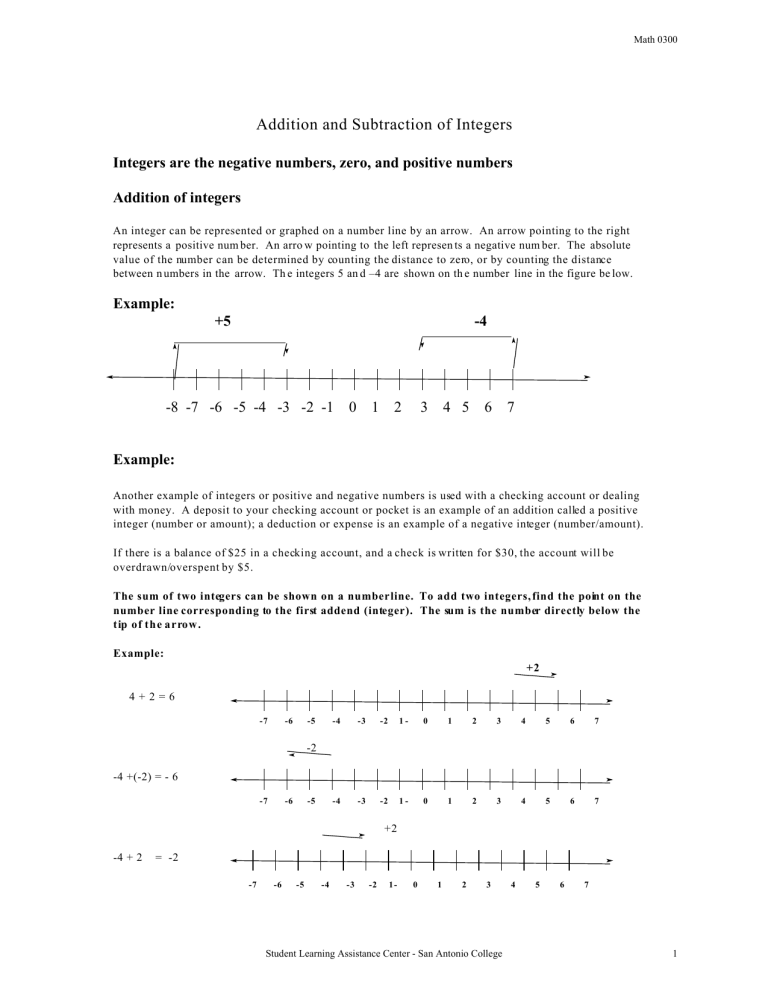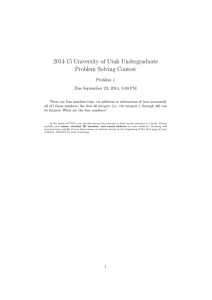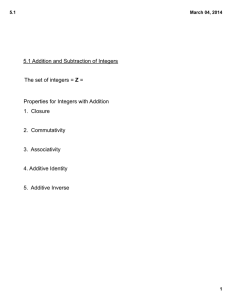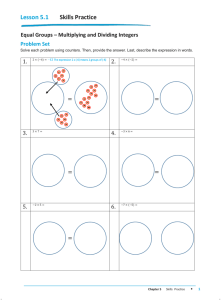
Math 0300 Addition and Subtraction of Integers Integers are the negative numbers, zero, and positive numbers Addition of integers An integer can be represented or graphed on a number line by an arrow. An arrow pointing to the right represents a positive num ber. An arro w pointing to the left represen ts a negative num ber. The absolute value of the number can be determined by counting the distance to zero, or by counting the distance between n umbers in the arrow. Th e integers 5 an d –4 are shown on th e number line in the figure be low. Example: +5 -4 -8 -7 -6 -5 -4 -3 -2 -1 0 1 2 3 4 5 6 7 Example: Another example of integers or positive and negative numbers is used with a checking account or dealing with money. A deposit to your checking account or pocket is an example of an addition called a positive integer (number or amount); a deduction or expense is an example of a negative integer (number/amount). If there is a balance of $25 in a checking account, and a check is written for $30, the account will be overdrawn/overspent by $5. The sum of two integers can be shown on a number line. To add two integers, find the point on the number line corresponding to the first addend (integer). The sum is the number directly below the tip of the arrow. Example: +2 4+2=6 -7 -6 -5 -4 -3 -2 1- 0 1 2 3 4 5 6 7 -4 -3 -2 1- 0 1 2 3 4 5 6 7 -2 -4 +(-2) = - 6 -7 -6 -5 +2 -4 + 2 = -2 -7 -6 -5 -4 -3 -2 1- 0 1 2 3 Student Learning Assistance Center - San Antonio College 4 5 6 7 1 Math 0300 -2 4 + (-2) = 2 -7 -6 -5 -4 -3 -2 1- 0 1 2 3 4 5 6 7 The signs of the addends can categorize the sums shown above. The addends have the same sign. 4+2=6 -4 + (-2) = -6 positive 4 plus positive 2 equals 6 negative 4 plus negative 2 equals –6 The adde nds have differ ent signs. -4 + 2 = -2 negative 4 plus positive 2 equals negative 2 4 + (-2) = -6 positive 4 plus negative 2 equals positive 2 The rule for adding two integers depends on whether the signs of the addends are the same or different. Rule for A dding Tw o Integers: TO ADD INTEGERS W ITH THE SA ME SIGN , add the absolute values of the numbers. Then attach the sign of the adden ds. TO A DD IN TEGE RS W ITH D IFFER ENT S IGNS , find the ab solute va lues of the numbe rs. Subtract the smaller absolute value from the larger absolute value. Then attach the sign of the addend with the largest value. Examples: Add: (-4) +(-9) = -13 -14 + (-47) = - 61 6 + -13 = -7 162 + (-247) = -85 -8 + 8 = 0 Note: in the last example we are adding a number and its opposite –8 + 8 = 0. The sum of a number and its additive inverse is always zero. Student Learning Assistance Center - San Antonio College 2 Math 0300 The properties of addition of whole numbers hold true for integers too. The Addition Property of Zero a + 0 = a or 0 + a = a The Commutative Property of Addition a+b=b+a The Associative Property of Addition (a + b) + c = a + (b + c) The Inverse Property of Addition a + (-a) = 0 or -a + a = 0 Add: (-4) + (-6) +(-8) + 9 Add the first two numbers (-4) + (-6) = (-10) Add the sum to the third number (-10) + (-8) = (-18) Continue until all the numbers have been added (-18) + 9 = -9 Example: Add the five changes in price of stock: -2 + (-3) + (-1) + (-2) + (-1) = (-5) + (-1) +(-2) + (-1) = (-6) +(-2) + (-1) = -8 + (-1) = -9 The change is – 9. This means that the price of the stock fell $9 per share. Example: Evaluate –x + y when x = -15 and y = -5. -x + y Replace x with –15 and y with –5 -(-15) + (-5) Simplify –(-15). =15 + (-5) Add = 10 Student Learning Assistance Center - San Antonio College 3 Math 0300 Example: Is – 7 a solution of the equation x + 4 = - 3? Replace x by - 7 and then simplify. –7 + 4 = -3 -3 = -3 The results are equal. –7 is a solution of the equation. Subtraction of integers Recall that the sign – can indicate the sign of a number, as in –3 (negative 3), or can indicate the operation of subtraction, as in 9 – 3 (nine minus three). Subtraction of integers can be written as the addition of the oppo site number. To sub tract two integers, rewrite the subtraction expression as the first number plus the opposite of the second number. Some examples are shown below. First number - second number = First number + opposite of the second number 8 - 15 = 8 + (-15) = -7 8 - (-15) = 8 + 15 = 23 -8 - 15 = -8 + (-15) = -23 -8 - (-15) = -8 + 15 = 7 Rule for Subtracting Two Integers To subtract two integers, add the opposite of the second integer to the first integer. This can be written symbolically as a - b = a + (-b). Subtract (-15) – 75 Rewrite the subtraction operation as he sum of the first number and the opposite of the second number. The opposite of 75 is - 75. (-15) - 75 = (-15) + (-75) = - 90 Add. When subtraction o ccurs severa l times in an exp ression, rewrite each subtra ction as add ition of the op posite and then add. Student Learning Assistance Center - San Antonio College 4 Math 0300 Subtract : -13 - 5 - (-8) Rewrite each subtraction as addition of the Opposite. Add. -13 - 5 - (-8) = -13 + (-5) + 8 = -18 + 8 = - 10 Student Learning Assistance Center - San Antonio College 5




